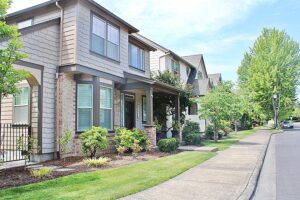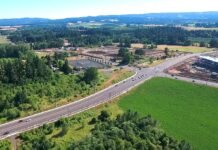
“This has been an extremely long road,” said King City Mayor Jaimie Fender at a June 14 City Council meeting, referring to the 5 1/2-year-long process to approve a plan to develop Kingston Terrace.

Kingston Terrace, 528 acres of mostly rural properties and farms, is located between the western boundary of the city, the Tualatin River, and Beef Bend and Roy Rogers roads. King City added the area to its urban growth boundary in 2018 after getting approval from the Metro Council.
Since that time, city officials and planning consultants have worked to come up with a plan to deal with the area’s natural topography while planning for transportation routes, a town center, 3,300 to 3,600 housing units of different types, and park and recreation opportunities within about 318 acres.
Many speakers at the public hearings and meetings were opposed to extending Fischer Road from where it dead-ends in the Edgewater subdivision because of disruption to existing homes and established neighborhoods and environmental damage. After hundreds of people turned out at previous meetings, barely a handful of folks came to the June meeting, which was held after the public comment period was closed. By the time the council voted 6 to 1 to approve Ordinance 02023-01 to adopt the King City Transportation System Plan (TSP) that will extend Fischer Road, they had left.
“Speaking from my heart, on paper it looks like the best alternative, but my job – our job – is to listen to community members,” said Councilor Shawna Thompson. “With over 600 letters on record against this alternative, I have no other choice than to vote no. There are too many community members who are absolutely against it, and it will impact too many negatively.
“With my real estate background, there may be a lot of financial loss to these homeowners, and I don’t want any community member to suffer a loss based on my decision. We should vote on what we would want if we were in our community members’ shoes. These are our neighbors, and they have valid concerns. They don’t want a thoroughfare in front of their house.”
Councilor Marc Manelis said, “I agree with that, but if we look 20 years down the road, Beef Bend will have way too much traffic (if the TSP isn’t implemented). Do I like it? Not really, but three consulting firms worked on it.”
Thompson responded, “There were four other alternatives to take the load off Beef Bend. This is a very quiet community, and we don’t want to overload Beef Bend, but that doesn’t mean we can’t pick an alternative.”
Fender said, “Community impact is vital, and people’s concerns were all valid for the most part, but we can’t plan by contemplating individual properties and individual parcels of ownership. The city looked at the future growth of the area. We looked at the entire region and superimposed a plan over it.
“What is different is that throughout the process, a whole spectrum of concerns came up about private properties… We had to look at what is going to benefit the most to the detriment of the least people…
“Other alternatives negatively affected our most vulnerable community members. Displacing our most marginalized community members has never been a good way to do land use and policy. Our most vulnerable community members live along Beef Bend in the mobile home park and in areas that would be very easy to push a road through and move them. I categorically reject displacing our most vulnerable to lessen the impact for a few people. I’m OK with that decision.”
Councilor Thompson said there were other options and wondered if these vulnerable people had been approached about selling their properties as opposed to condemning their land (using eminent domain to acquire property for public use).
Councilor Micah Paulsen said, “My take on this is that this option provides the least amount of impact on the community. When you look at the different costs and different options and the analysis that was done for the systems plan, it makes the most sense.”
Paulsen said he has walked around Edgewater a lot since he moved there seven years ago and has thought from the beginning that “Fischer Road looks like an unfinished street.” He added, “It makes the most sense logically and from a financial sense and impact on the people (to put it through). I read all the comments carefully, but extending Fischer has the least amount of impact on the existing community and the largest amount of benefit for the community as a whole.”
Councilor Laurie Petrie noted that the plan “covers so much more than these routes being proposed.” She added, “We really have to look at the whole of this. We are trying to do something for the city as a whole, not for one particular neighborhood or any particular person. What I keep coming back to is that this route does not destroy any homes, and it affects no people. It uses existing rights of way. It really in the long run makes the most sense when you look at it – the movement in the various neighborhoods and the interaction with the river – all of it.
“We have to be cognizant of the whole and not just one individual or any particular group. That is what’s important to me.”
Councilor Smart Ocholi commented that King City needs to plan for the future and for future population growth. “This was not a rush job,” he said. “We needed a system in place, and we made sure everyone was heard.”
Councilor Kate Mohr said, “We need to ensure the healthy growth of King City,” and she added that a future without a Master Plan or Transportation System Plan would lead to chaos. “This is an opportunity to control the growth of the city. The evidence that we care is not whether or not we agree with each other. Each of us cares about the future of King City and the residents King City.”





















